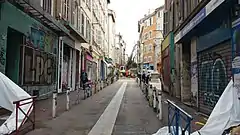2018 Marseille building collapse
At 9 am on November 5, 2018, two buildings in Marseille, numbers 63 and 65 Rue d'Aubagne, collapsed in the center of Marseille,[1][2] killing eight people in the crowded neighborhood of Noailles. Number 63 was unoccupied, belonging since 2016 to the economic improvement company Marseille Habitat, but number 65 was occupied with people living in the building. Eight bodies were found in the rubble,[3][4][5] when the search for survivors came to an end on 9 November. Emergency services immediately demolished the building next to number 67, as it was unoccupied and equally fragile.
 | |
| Date | 5 November 2018 |
|---|---|
| Location | Marseille, France |
| Deaths | 8 |
The local government, overwhelmed by the management of this drama, evacuated at least 4,500 Marseille locals from 578 dangerous buildings during the months following the accident, but many are still lodged in their "temporary" housing. Most of the evacuees were from the ethnic minorities living in these buildings, and were moved from their houses to safer accommodation.[6] The management crisis became the norm: one year after the accident, the "Haute Comité au logement" spoke of a humanitarian crisis. Three years after the accident, 1,500 people still live in their temporary lodging.
After the collapse, the tenants of the houses in the center of Marseille cited laziness on the part of the town hall because most buildings in the center of Marseille are dilapidated and not maintained.[7]
During a march to honour the victims on 10 November, which gathered 8,000 people, according to the authorities, a balcony collapsed, injuring three.[8]
The indictments began in November 2020 with those of Marseille Habitat (owner of No. 63), Julien Ruas (close to Jean-Claude Gaudin and his deputy in charge of the risk management and prevention department), and the Liautard firm (co-ownership manager in charge of No. 65). The investigation could last for many years.[9]
The dilapidation of Marseille's housing
The accident revealed the dilapidated state of Marseille's housing [10][11] (100,000 Marseillais live in slums according to the Fondation Abbé Pierre, and 13% of Marseille's housing is considered to be substandard), as well as the mayor's inaction.[12][13][14]
In 2015, a report from the honorary inspector general of the administration of sustainable development titled "Private Real Estate in Marseille"[15] ordered and made public by the minister of housing, Silvia Pinel,[16] had already overwhelmed the municipality. It concluded that "100,000 people live in unsanitary housing in Marseille."[17][18]
After the collapse, the Haut comité pour le logement des personnes défavorisées (High Committee for the Housing of Disadvantaged Persons) publicized on 21 November a report submitted to President Emmanuel Macron and Prime Minister Édouard Philippe with the evocative title "Marseille: From Housing to Humanitarian Crisis."[19][20] In the report, it is claimed that "the collapses of the buildings on rue d'Aubagne were not accidental and unforeseeable events. They resulted from a continuity of dysfunction from public actors," thus pointing the finger at the City Council and the French government, reminding that "the prefect could have given the city formal notice to investigate the claims of the city's insalubrity."[21]
References
- Willsher, Kim (6 November 2018). "Marseille building collapse: four bodies found as search continues". the Guardian. Retrieved 10 November 2018.
- "Marseille: the psychosis settles after the collapse of the rue d'aubagne | The Koz Post". kozpost.com. Archived from the original on 11 November 2018. Retrieved 10 November 2018.
- "Death Toll in Marseille Building Collapse Rises to 6". Retrieved 20 November 2018.
- Willsher, Kim (7 November 2018). "Marseille building collapse: sixth body found in rubble". the Guardian. Retrieved 11 November 2018.
- "Death toll up to 8 in Marseille building collapse". ABC News. Archived from the original on 11 November 2018. Retrieved 11 November 2018.
- "As Slums Teeter in Marseille, a Poverty Crisis Turns Deadly". Retrieved 20 November 2018.
- "Avant l'effondrement des immeubles, la gestion de l'habitat par la mairie de Marseille déjà critiquée". Le Monde.fr (in French). Retrieved 12 November 2018.
- "Marseille building collapse: balcony gives way as city honours victims". 11 November 2018.
- Harounyan, Stéphanie. "Drame de la rue d'Aubagne: deux mises en examen de plus". Libération (in French). Retrieved 21 September 2021.
- Dans le centre-ville de Marseille, 13 % de l'habitat est indigne, Le Monde, 6 November 2018
- Incurie municipale à Marseille ? Quand la cité phocéenne passait sous tutelle de l'État, France Culture, 6 November 2018
- François Bonnet, A Marseille, une mairie incompeténte et un Etat absent, Mediapart, 6 November 2018
- Effondrement d'un immeuble à Marseille: critiqué, le maire Jean-Claude Gaudin défend les efforts de la ville, Le Monde, 8 November 2018
- Immeubles effondrés à Marseille: Laisser pourrir le quartier Noailles procède d'une stratégie politique, Le Monde, 22 November 2018
- "Parc immobilier privé à Marseille: rapport de Christian Nicol - CRES Paca"
- Logement indigne à Marseille: un rapport au vitriol, Marsactu, 4 November 2015
- Effondrements d'immeubles à Marseille: logement insalubre, un constat terrible, La Provence, 6 November 2018
- "Marseille: dix personnes introuvables après l'effondrement de deux immeubles". Le Monde.fr (in French). 5 November 2018. Retrieved 21 September 2021.
- A Marseille, la crise du logement est désormais «une véritable crise humanitaire, Le Monde, 21 November 2019
- David Coquille, A Marseille, la crise du logement est une crise humanitaire - Journal La Marseillaise
- Marseille : le Haut Comité au logement démolit l'action publique from Libération.fr, 5 November 2019